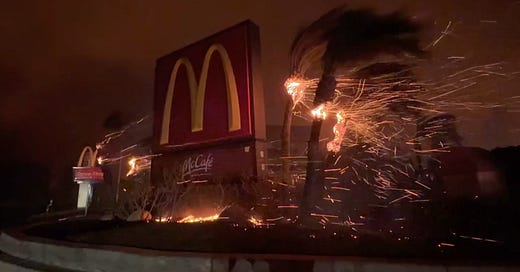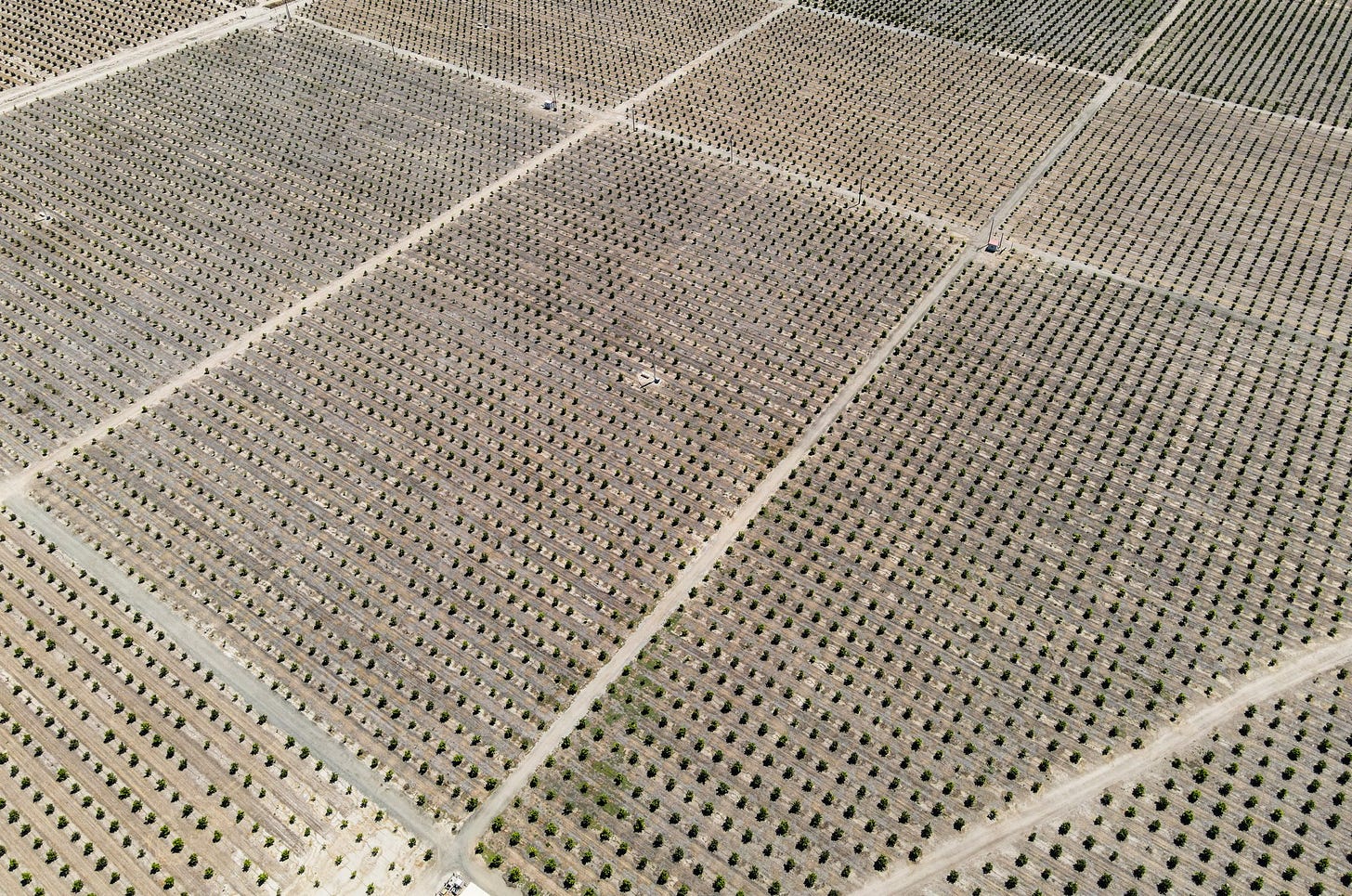I’ve written so many unpublished words about California over the years. There is something enigmatic about it — its history rife with the most extreme versions of the culture that we live in today, the culture that will choke us, smother us, and fill our lungs with smoke.
It is said that the Gold Rush never ended in California — that the ideology of control, extraction, and exploitation of the land is baked into the culture that rose to dominate it after genociding its original inhabitants several hundred years ago. Boom and bust, prior appropriation — first come, first serve. First it was gold, then it was water, then it was cattle, and today, its monocultures for export: thousands of them.
What was once the largest wetland on the western edge of this continent is now a vast plain of industrial agriculture, filled with pesticides, machines, and straight lines. Sucking water from the Sierra Nevadas, Mount Shasta, and the water beneath the Central Valley, this agricultural system uses an incomprehensible amount of water, energy, and human labor. California almonds alone consume as much water annually as Los Angeles, a city of twelve and a half million people, uses in three years. Much of the water in California is controlled by a handful of Big Agribusiness giants. Farmers suck out so much water from aquifers that the land is sinking. Every ounce of water is managed and controlled.
On top of that, indigenous fire management has been marginalized and criminalized across California for generations, leading a fire-adapted landscape oxidized and ready to be kindled. The ecologically unsound management of the land has led to an incredible decrease in animal activity, preventing nutrient cycling on the state’s many, grassy knolls.
Right now, there is a lot of blame being lobbed around for the wildfires. This is God smiting our modern Sodom and Gomorrah. This is because the Democratic mayor stopped funding the fire department. This is climate change. Blame, particularly pointed blame, gives us an unearned sense of certainty.
The truth is far more complex and diffuse than we want to admit, and reaches back farther into our history than most of us have taken the time to comprehend. But when we take the time to peel back the layers, trying to understand the genesis of such a nightmare scenario as we’re seeing in Los Angeles, what we see is a mirror to all of modernity.
What I will say (and of this, I am certain) is that we could be producing exactly zero carbon emissions and these fires would still be happening. It is reckless to blame this on climate change, not because climate change is irrelevant, but because our framework of understanding climate change is far too narrow to be able to understand what this actually is: the systematic, culture-wide alienation from nature which has led us to create a suicidal civilization; the unmooring of the human psyche from its place within ecological limits; the belief that we are gods and can act without consequence. Climate change is merely an unfortunate element this much more difficult and permanent cultural crisis.
In story structure, a pinch point is when we’re reminded that the enemy is closing in — it’s a nudge from the storyteller that there is danger looming on the horizon, lest we’ve forgotten. California is that — it’s a chronically mismanaged tinderbox, a canary in the coal mine. It’s the extreme version of what we’ve been building for hundreds of years, and it will be the first to crumble under the weight of its complexity and ecological drawdown. These flames are a reminder that we are beyond the latency phase of our decisions — now, LA is burning. We can’t pretend it’s not.
What is happening now is a warning of what’s to come, as all landscapes have been systematically degraded through the spread of our civilization. California — at once desert, rainforest, grassland, and alpine — has been treated for centuries as just one thing: a commodity. All the world has been converted into dollar signs in modernity, and we’ll be foolish to think that we’re safe from those flames lapping upon the ocean.
The arc of our story of ecological destruction is long, and we are far from the denouement. Finally, we’re done with the fun and games and we’re remembering the enemy is at the gates. But the enemy is not some vague notion of God or nature’s vengeance, or climate change itself — the enemy is us and our pattern of behavior within a cultural milieu that developed long ago. The culture we have created encourages all the world to be like California: controlled, mechanized, productive. This is not an enemy that can be destroyed. It cannot be merely blamed. It can only be transformed.
The question is, will we transform ourselves through our own will, or will we falter, our story fading to dust as each civilization that came before us has?
We’ll discuss this and more in our upcoming video. For now, our hearts go out to those suffering and grieving from loss, and to those who have lost their lives in California. May these fires not be forgotten, and may they not die in vain.
Written by Maren Morgan
Thank you for your attention. If you’d like to support the project and gain access to future full podcasts, essays, and videos without ads, and be able to comment on posts, please consider becoming a paid subscriber or joining us on Patreon for as little as $5 a month.






